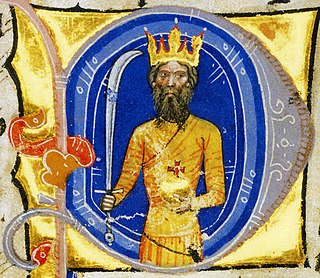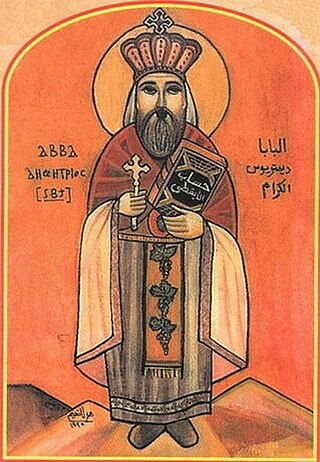Related Research Articles

Attila, frequently called Attila the Hun, was the ruler of the Huns from 434 until his death, in March 453. He was also the leader of an empire consisting of Huns, Ostrogoths, Alans, and Bulgars, among others, in Central and Eastern Europe.

Bleda was a Hunnic ruler, the brother of Attila the Hun.

Paul of Samosata was Bishop of Antioch from 260 to 268 and the originator of the Paulianist heresy named after him. He was a believer in monarchianism, a nontrinitarian doctrine; his teachings reflect adoptionism.

Demetrius I, 12th Bishop and Patriarch of Alexandria. Sextus Julius Africanus, who visited Alexandria in the Bishoprice of Demetrius, places his accession as eleventh bishop from Mark in the tenth year of Roman Emperor Commodus; Eusebius of Caesarea places it in the tenth year of Septimus Severus.
An apostolic see is an episcopal see whose foundation is attributed to one or more of the apostles of Jesus or to one of their close associates. In Catholicism, the phrase "The Apostolic See" when capitalized refers specifically to the See of Rome.

Eustathius of Antioch, sometimes surnamed the Great, was a Christian bishop and archbishop of Antioch in the 4th century. His feast day in the Eastern Orthodox Church is February 21.

April 19 - Eastern Orthodox liturgical calendar - April 21

Methodius of Olympus was an early Christian bishop, ecclesiastical author, and martyr. Today, he is honored as a saint and Church Father; the Catholic Church commemorates his feast on June 20.
Firmilian, Bishop of Caesarea Mazaca from c. 232, was a disciple of Origen. He had a contemporary reputation comparable to that of Dionysius of Alexandria or Cyprian, bishop of Carthage. He took an active part in the mid-3rd century controversies over rebaptising heretics and readmitting lapsed Christians after the persecutions of Decius and was excommunicated by Pope Stephen I for his position. A single letter of Firmilian to Cyprian survives among Cyprian's correspondence. Jerome omits Firmilian from De viris illustribus. "To his contemporaries his forty years of influential episcopate, his friendship with Origen and Dionysius, the appeal to him of Cyprian, and his censure of Stephanus might well make him seem the most conspicuous figure of his time" (Wace).

Saint Victorinus of Pettau was an Early Christian ecclesiastical writer who flourished about 270, and who was martyred during the persecutions of Emperor Diocletian. A Bishop of Poetovio in Pannonia, Victorinus is also known as Victorinus Petavionensis or Poetovionensis. Victorinus composed commentaries on various texts within the Christians' Holy Scriptures.
Dengizich, was a Hunnic ruler and son of Attila. After Attila's death in 453 AD, his empire crumbled and its remains were ruled by his three sons, Ellac, Dengizich and Ernak. He succeeded his older brother Ellac in 454 AD, and probably ruled simultaneously over the Huns in dual kingship with his brother Ernak, but separate divisions in separate lands.

Alexander of Jerusalem was a third century bishop who is venerated as a martyr and saint by the Eastern Orthodox Church, Oriental Orthodox churches, and the Roman Catholic Church. He died during the persecution of Emperor Decius.
Theotimos (Θεότιμος) is a Greek name, derived from theos, meaning 'god', and timè, meaning 'honour gift'. Its Latinized form is Theotimus.
The Scythian monks were a community of monks from the region around the mouths of the Danube, who played an influential role in Christian theological disputes between the 4th and 6th centuries. The name Scythian comes from Scythia Minor, the classical name of the modern Dobruja region in Romania and Bulgaria, at the time a Roman province. The monks were raised not only from local Christian elements, but also from immigrant Christians who came to live ascetic lives.

Maximus of Turin is the first known Christian Bishop of Turin. He was a theological writer who "made a great contribution to the spread and consolidation of Christianity in Northern Italy".

Ellac was the oldest son of Attila (434–453) and Kreka. After Attila's death in 453 AD, his empire crumbled, and its remains were ruled by his three sons, Ellac, Dengizich and Ernak. He ruled briefly and died at the Battle of Nedao in 454 AD. Ellac was succeeded by his brothers, Dengizich and Ernak.
Basilides and Potamiaena were Christian martyrs now venerated as saints. Both died in Alexandria during the persecutions under Septimius Severus.
Saint Bretannio was a bishop of Tomi during the fourth century. Of Cappadocian origin, he occupied the see of Tomi from 360.
Vitalian was a general of the Eastern Roman Empire. A native of Moesia in the northern Balkans, and probably of mixed Roman and Gothic or Scythian barbarian descent, he followed his father into the imperial army, and by 513 had become a senior commander in Thrace.

The Church Fathers, Early Church Fathers, Christian Fathers, or Fathers of the Church were ancient and influential Christian theologians and writers who established the intellectual and doctrinal foundations of Christianity. The historical period in which they worked became known as the Patristic Era and spans approximately from the late 1st to mid-8th centuries, flourishing in particular during the 4th and 5th centuries, when Christianity was in the process of establishing itself as the state church of the Roman Empire.
References
- ↑ Vailhé, Siméon. "Tomi." The Catholic Encyclopedia Vol. 14. New York: Robert Appleton Company, 1912. 26 November 2021
 This article incorporates text from this source, which is in the public domain .
This article incorporates text from this source, which is in the public domain .